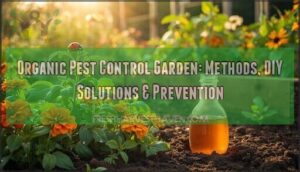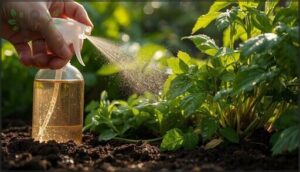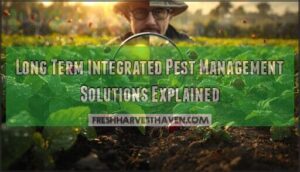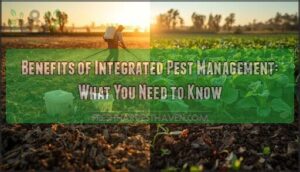This site is supported by our readers. We may earn a commission, at no cost to you, if you purchase through links.
Chemical pesticides promised a shortcut to pest-free gardens, but they left behind damaged soil, poisoned groundwater, and collapsing bee populations. Now gardeners are rediscovering what farmers knew for centuries: nature has its own pest control systems, and they work better than anything in a spray bottle.
Your organic pest control garden doesn’t just reduce harmful chemicals—it builds a living fortress where beneficial insects patrol your tomatoes, companion plants confuse invaders, and healthy soil grows plants too vigorous for pests to overtake. The shift requires learning a new language of ladybugs and neem oil, but you’ll gain control over what touches your food while creating habitat that hums with life.
From strategic planting patterns to homemade sprays that cost pennies, these science-backed methods turn your garden into an ecosystem that defends itself.
Table Of Contents
- Key Takeaways
- Benefits of Organic Pest Control in Gardens
- Essential Organic Pest Control Methods
- DIY Organic Pest Repellents and Solutions
- Attracting Beneficial Insects and Animals
- Preventing and Managing Garden Pest Problems
- Frequently Asked Questions (FAQs)
- What is the best organic pesticide for gardens?
- What are natural pest repellents for gardens?
- What do organic farmers use to keep pests away?
- How do you control insects in an organic garden?
- What is the best natural pesticide for gardens?
- What do organic farmers use for pest control?
- How to get rid of garden pests without pesticides?
- How do I keep bugs out of my garden naturally?
- How do I keep pests out of my garden naturally?
- What is the best organic pesticide for vegetables?
- Conclusion
Key Takeaways
- Organic pest control builds a self-defending garden ecosystem by combining companion planting, beneficial insects, and physical barriers instead of synthetic chemicals that damage soil and poison pollinators.
- Natural methods like neem oil, diatomaceous earth, and homemade garlic sprays cost pennies while achieving 85-95% pest mortality rates without harming ladybugs, bees, or other garden allies.
- Healthy soil packed with beneficial microbes grows vigorous plants that naturally resist pests, while crop rotation and pest-resistant varieties disrupt pest life cycles before infestations start.
- Attracting beneficial predators through diverse native flowers and strategic habitat creates a living fortress where nature handles pest control automatically, slashing synthetic pesticide use by up to 70 percent.
Benefits of Organic Pest Control in Gardens
Switching to organic pest control isn’t just about ditching chemicals—it’s about building a garden that works with nature instead of against it. When you trade synthetic sprays for natural methods, you’re making a choice that ripples through your entire yard.
Here’s what you gain when you go organic.
Healthier Plants and Soil
Skip the chemicals and watch your garden thrive. Organic pest control builds healthy soil packed with beneficial microbes that boost plant nutrition naturally. Stronger plants mean fewer pest problems. Natural pest control methods reduce stress on your plants while improving water retention and nutrient availability. Your soil becomes a living fortress.
Organic pest control transforms your soil into a living fortress where beneficial microbes feed stronger plants that naturally resist pests
Soil testing guides your organic gardening techniques, helping you add the right organic matter to create a balanced ecosystem. By using a scientific study framework, gardeners can better understand the importance of methodological rigor in maintaining a healthy ecosystem.
Safer Food and Environment
Growing your own food with organic pest control means fewer synthetic pesticide residues on your harvest. You’re protecting water quality by cutting chemical runoff that pollutes local groundwater.
Natural pest management promotes sustainable farming practices right in your backyard, building healthier ecosystems while keeping your family safe.
Integrated pest management and sustainable gardening practices give you real food safety and environmental conservation without compromise.
Protection of Pollinators and Wildlife
Your garden can become a sanctuary for pollinators and wildlife when you choose eco-friendly methods over synthetic pesticides. Organic approaches protect bees, butterflies, and beneficial insects while promoting biodiversity protection and wildlife conservation.
- Plant diverse flowers across seasons to support pollinator conservation and wildlife habitat needs
- Attract birds for natural pest management and biological control of unwanted insects
- Time applications of neem or soap sprays to early morning, protecting active pollinators
- Preserve native plantings and hedgerows for sustainable gardening and bird attraction
Reduced Chemical Use
Beyond protecting pollinators, you’ll slash synthetic pesticide use by up to 70 percent with organic pest control. That’s a huge win for chemical-free gardening and sustainable practices. Companion planting, physical barriers, and beneficial insects replace harsh sprays while maintaining healthy yields.
Your soil loses detectable residues within one season, and you reduce health risks for your family. These eco-friendly solutions prove green gardening tips work without compromise.
Essential Organic Pest Control Methods
You don’t need toxic chemicals to protect your garden from pests. There are proven organic methods that work with nature instead of against it.
Let’s look at four essential strategies that give you real control over garden invaders.
Companion Planting Strategies
Think of companion planting as nature’s pest deterrents—strategic plant pairings that protect your crops without chemicals. This biological pest control method is the foundation of integrated pest management, creating a garden layout where plants work together as natural pest repellents.
You’ll boost crop diversity and soil health by mixing crops that repel each other’s enemies. Marigolds near tomatoes deter aphids, while basil guards peppers.
Natural Insecticides and Repellents
When companion planting isn’t enough, you’ll need backup. Botanical extracts like neem oil spray and spinosad target pests without harming beneficial insects. These natural insecticides work through contact and ingestion:
- Neem oil disrupts insect growth and feeding patterns
- Garlic spray and hot pepper spray repel soft-bodied pests
- Insecticidal soap breaks down protective coatings on aphids
- Diatomaceous earth physically desiccates crawling insects
Apply early morning for best results.
Physical Barriers and Traps
Sometimes the simplest defense is the strongest one. Floating row covers and mesh tunnels block flying insects while letting light through—just secure edges with sealant methods to stop gaps.
Sticky traps catch aphids before populations explode, and trap crops lure pests away from your prized vegetables. You’re building a fortress without chemicals, giving your garden the upper hand against invaders.
Handpicking and Manual Removal
Your hands are your most precise handpicking tools for organic pest control. During routine pest inspection, pluck off caterpillars, beetles, and egg masses before they multiply. Manual removal works best in small gardens where pest monitoring is simple.
- Wear gloves to protect against irritation
- Check plants daily for nymphs and adults
- Drop pests into soapy water
- Disturb soil around roots to expose hidden grubs
This physical removal strategy fits naturally into pest management strategies.
DIY Organic Pest Repellents and Solutions
You don’t need fancy products to keep pests away. Your kitchen and garden shed already hold the ingredients for powerful, natural pest control solutions.
Let’s look at four simple DIY options that work wonders without breaking the bank.
Homemade Garlic and Pepper Sprays
Garlic spray efficacy and hot pepper spray formulation stand out as reliable organic pest deterrents. These homemade insecticides work because capsaicin irritates chewing insects while allicin in garlic repels many pests.
To create these solutions, blend fresh garlic and peppers with water, strain the mix, then add a drop of soap for better adhesion. Test on a small leaf first—some plants show sensitivity to concentrated natural repellent methods.
Using Diatomaceous Earth and Neem Oil
Two garden superstars—diatomaceous earth and neem oil—tackle pests through different pathways in your organic pest control arsenal. These natural pest control methods shine in integrated pest management when you follow smart application practices:
- Apply diatomaceous earth when plants are dry; moisture reduces its abrasive action against crawling pests
- Use neem oil during early morning or evening to prevent leaf burn
- Reapply after rainfall since both organic sprays lose effectiveness when wet
- Target infested areas to protect beneficial insects and maintain garden ecosystems
Always prioritize neem oil safety by following label concentrations.
Essential Oil-Based Sprays
Beyond neem oil, essential oil sprays add another layer to your organic pest control toolkit. Peppermint, lavender, and lemon eucalyptus work as natural pest repellent recipes when mixed with water and a drop of dish soap.
Oil concentration effects matter—start with 10-15 drops per cup to avoid leaf burn. Spray application timing during early morning gives you the best pest repellent blends without harming plants.
Simple Soap Sprays for Soft-Bodied Insects
Soap spray formulation couldn’t be simpler for organic pest control. Mix 1-2 tablespoons of pure castile soap per quart of water—that soap concentration level hits 85-95% insect mortality rates against aphids and whiteflies without harming beneficial insects.
Here’s your spray application timing checklist:
- Apply during early morning or evening when temperatures stay below 90°F
- Test on a small leaf section 24 hours before treating sensitive plants
- Coat leaf undersides thoroughly where 70-80% of pests hide
Plant safety measures matter. Rinse treated foliage after 2-3 hours to prevent leaf burn, especially on drought-stressed plants. This natural pest control method works only on contact, so reapply every 4-7 days during active infestations.
Attracting Beneficial Insects and Animals
You don’t have to fight garden pests alone. Nature provides an army of helpful creatures that’ll do the heavy lifting for you.
Here’s how to recruit these garden superstars and keep them working on your side.
Ladybugs, Praying Mantises, and Predatory Beetles
These garden superstars devour pests by the hundreds. Ladybugs tackle aphids and mites—key players in biological pest control. Praying mantises hunt larger invaders but may snack on beneficial insects too. Predatory beetles work the ground, targeting caterpillars and soft-bodied pests.
Understanding predator ecology helps you time releases with pest outbreaks, making natural pest control work harder in your integrated pest management system.
Providing Habitat for Birds and Pollinators
Birds and pollinators need more than just predatory beetles patrolling your garden—they need a place to call home. Plant native flowers that bloom spring through fall for continuous nectar. Add shrubs and grasses to create bird-friendly plants with shelter and nesting spots. Leave leaf litter undisturbed for ground-nesters. Set out shallow water dishes.
This wildlife conservation approach strengthens your garden ecosystem while supporting biodiversity and biological pest control naturally.
Planting Diverse Flowers for Insect Attraction
Color is your secret weapon for drawing beneficial insects into your garden. Mix native plantings with diverse flower color schemes to create pollinator-friendly habitat that doubles as natural pest control. Think vibrant purples, yellows, and blues clustered together:
- Plant three to five distinct colors in clumps for visual impact
- Choose tubular and flat blooms to accommodate different insect types
- Layer groundcovers with tall stems for accessibility
- Rotate flowering families yearly to boost garden biodiversity
This companion planting strategy strengthens integrated pest control while supporting organic pest control through insect attraction naturally.
Using Bacillus Thuringiensis (Bt) Safely
Caterpillars munching your kale? Bacillus Thuringiensis offers biological pest control methods that target larvae without harming beneficials. This organic pest control weapon requires careful Bt application and label compliance for success.
| Aspect | Best Practice | Why It Matters |
|---|---|---|
| Timing | Apply to young caterpillars at dawn | Maximizes effectiveness before pest resistance develops |
| Coverage | Spray leaf undersides evenly | Ensures larvae ingest Bt during feeding |
| Reapplication | Every 5-7 days or after rain | Bt breaks down quickly under sunlight |
| Safe Handling | Wear gloves; store in cool, dry place | Protects you and maintains product potency |
| Environmental Impact | Avoid blooming flowers | Reduces minimal risk to pollinators |
Rotate Bt with other pest control methods within your integrated pest management plan. You’ll prevent resistance while protecting garden superstars like ladybugs and bees.
Preventing and Managing Garden Pest Problems
The best pest control strategy starts before pests ever show up. Prevention saves you time, money, and frustration down the road.
Here are four proven ways to stop pest problems before they start and manage them when they do appear.
Crop Rotation and Timely Planting
Rotating your crops throws pests off their game completely. When you move plant families each season, you disrupt pest life cycles and starve soil-dwelling troublemakers. Pair this with smart farm scheduling—planting when pest pressure naturally drops—and you’ve got a powerful integrated pest management strategy.
Track your seasonal rotation in a simple crop calendar. This organic gardening method builds healthier soil while keeping chemical use to zero.
Selecting Pest-Resistant Plants
Your best defense starts before pests even arrive—pick pest-resistant varieties bred to shrug off common invaders. Smart crop selection and plant breeding give you garden superstars that naturally repel trouble. Here’s your game plan for integrated pest management through strategic garden planning:
- Choose cultivars labeled resistant to local pests—check extension service recommendations for Ashburn
- Mix diverse varieties to prevent any single pest from gaining a foothold
- Select plants with natural deterrents like pungent aromas or dense foliage
- Source seed from reputable suppliers with documented field performance
- Combine companion planting with soil preparation to boost organic pest control
Test new varieties in small plots first. Track their performance over multiple seasons to verify they deliver real pest prevention in your organic gardening setup.
Maintaining Soil Health and Garden Hygiene
Healthy soil is your garden’s immune system—it crowds out pests before they settle in. Start with annual soil testing to guide organic amendments. Layer mulch to suppress weeds, lock in moisture, and control erosion. Use compost management practices that keep pathogens at bay. Adjust irrigation practices to prevent waterlogged conditions that invite disease.
| Garden Health Practice | Natural Pest Control Benefit | Organic Gardening Tips |
|---|---|---|
| Regular soil testing | Identifies nutrient gaps | Test every 2-3 years |
| Mulch benefits application | Blocks weed competition | Apply 2-3 inch layer |
| Compost management | Adds beneficial microbes | Turn pile weekly |
Monitoring and Combining Control Methods
Think of your organic pest control arsenal like a Swiss Army knife—each tool works better when paired with others. Regular pest monitoring lets you spot trouble early and apply targeted solutions.
Integrated pest management combines physical barriers with beneficial insects for maximum impact. Track your control scheduling and evaluate outcomes each season.
This method synergy creates resilient garden pest management that adjusts to changing conditions while minimizing risk.
Frequently Asked Questions (FAQs)
What is the best organic pesticide for gardens?
Your garden becomes a shield when you choose the right defender. Neem oil stands out as a flexible organic pest control solution—disrupting insect hormones while staying gentle on beneficial insects, pollinators, and your plants.
What are natural pest repellents for gardens?
Garlic spray, neem oil, and diatomaceous earth top the list of natural repellents. Essential oil blends and soap-based sprays also work well, creating effective garden barriers while keeping your organic pest control methods eco-friendly.
What do organic farmers use to keep pests away?
An ounce of prevention beats a pound of cure. Organic farmers rely on companion planting, natural barriers like diatomaceous earth, beneficial insects, and integrated pest management—eco-friendly solutions that protect crops while building garden health naturally.
How do you control insects in an organic garden?
You’ll need a layered approach: deploy biological controls like beneficial insects, apply organic sprays such as insecticidal soap and diatomaceous earth, practice garden sanitation, monitor pest life cycles regularly, and use targeted natural pest control methods.
What is the best natural pesticide for gardens?
Like a medieval knight’s armor, Neem Oil shields plants while fighting pests. Diatomaceous Earth and Bacillus Thuringiensis excel at organic pest control too.
Horticultural Oils and Insecticidal Soap smother insects effectively.
What do organic farmers use for pest control?
Organic farming relies on integrated pest management, combining biological control like Bt and beneficial insects, natural barriers such as row covers, physical methods including diatomaceous earth, and eco-friendly strategies like companion planting.
How to get rid of garden pests without pesticides?
Imagine this: aphids invade your tomatoes right before harvest. Instead of reaching for chemicals, try integrated pest management—combine DIY remedies like soap sprays with natural predators such as ladybugs to disrupt pest life cycles effectively.
How do I keep bugs out of my garden naturally?
Start with plant health—strong, well-spaced crops resist bugs better.
Add mulch, practice garden sanitation, and use floating row covers as bug barriers.
Combine natural pest control methods with horticultural oils for eco-friendly solutions that work.
How do I keep pests out of my garden naturally?
Keep garden pest prevention simple: plant companions like marigolds and basil, spray neem oil or garlic solutions, install physical barriers like row covers, and welcome beneficial insects—ladybugs are natural pest control superstars.
What is the best organic pesticide for vegetables?
No single organic pesticide works for everything. Bacillus thuringiensis targets caterpillars best, while neem oil controls aphids and mites.
Match your pest control methods to the specific pest threatening your vegetables for real results.
Conclusion
Picture your garden six months from now: lacewings patrolling kale leaves, marigolds standing guard at the tomato border, and soil so alive it practically hums. Your organic pest control garden won’t build itself overnight, but each method you implement—whether companion planting or homemade spray—shifts the balance toward health.
The chemicals stay in the shed. The beneficial insects arrive. And you harvest food that’s genuinely clean, grown in an ecosystem you designed to thrive without poison.
- https://today.tamu.edu/2020/01/15/study-shows-organic-wounds-improve-produce/
- https://www.linkedin.com/posts/bohdanlukianets_tasks-study-research-activity-7373377539521667072-UTEi
- https://www.sciencedirect.com/science/article/pii/S0749208123000268
- https://arxiv.org/html/2507.17948v2
- https://www.scribd.com/document/683678057/Academic-Research-Manual-V1-1-April-2016











